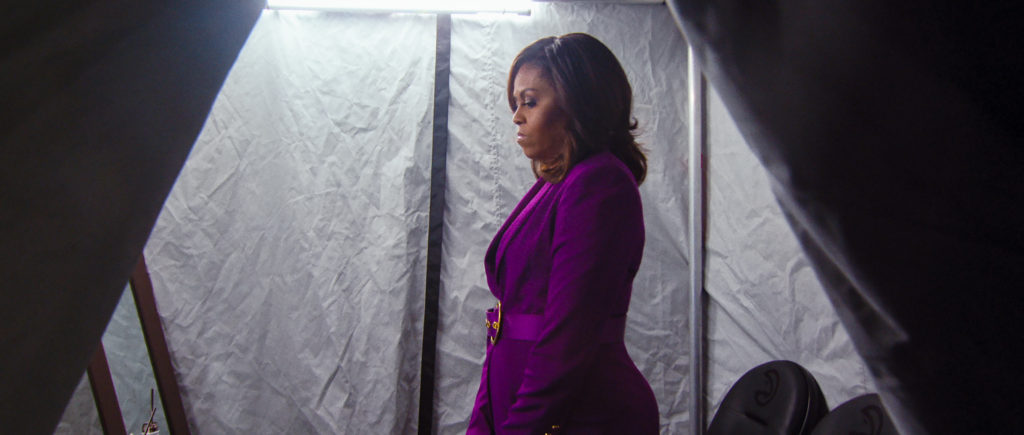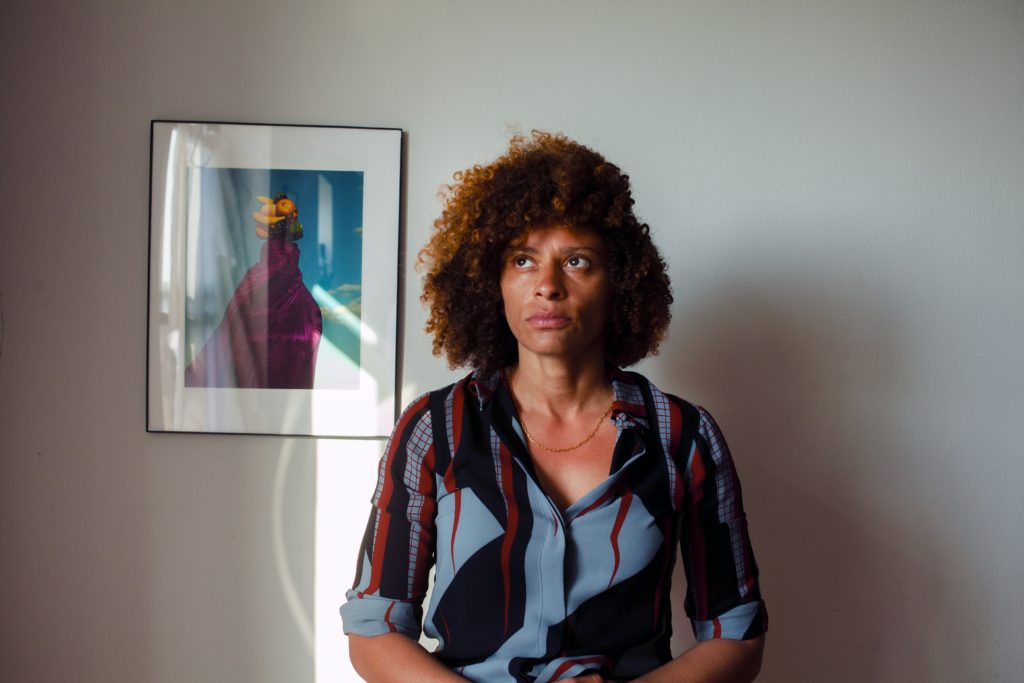“Becoming” offers a personal and intimate view into the world of Michelle Obama. Nadia Hallgren’s new Netflix documentary takes viewers on an all-access journey alongside the former First Lady during her 2019 nationwide book tour.
The film, from Barack and Michelle Obama’s Higher Ground Productions, is Hallgren’s first feature as a director, and one of her many cinematography credits. Her previous credits as a director and DP include several shorts and docuseries “She’s the Ticket.” “Trapped,” “Motherland,” and “We Will Rise: Michelle Obama’s Mission to Educate Girls Around the World” are among the other projects she’s worked on.
“Becoming” is now streaming on Netflix.
This interview has been edited.
W&H: Congrats on the success of “Becoming.” You acted as cinematographer and director on the film. What was it like becoming a significant part of Michelle Obama’s life for five months during the shoot?
NH: It felt so special becoming a part of Mrs. Obama’s life, especially at the moment when I was able to be with her. It was a time when she was ready to go out and share her story, which made it a pleasure to be in the moment with her and also share the ups and downs of how she was feeling.
W&H: And with the excitement comes pressure. You and your team seemed to have unprecedented access to your subject. How did you secure that access?
NH: I originally became a part of this project because of Priya Swaminathan, one of the co-heads at Higher Ground. She called me and said that Mrs. Obama was getting ready to go on a book tour and that they wanted it documented. At the time, they didn’t know if it would be a film or just something that would live in Mrs. Obama’s archives. It was just something she wanted to do. In turn, I was given unprecedented access to spend time with her.
W&H: Would you call this film a departure from your prior work in your portfolio? It’s your first feature film, but all your work is about social impact and courage, as is this film.
NH: I would say this film is a departure in the sense that I had never directed such a high-profile movie before. In Mrs. Obama’s story is an incredible journey that includes social impact. For me, I’m very interested in people and how people engage with the world. The idea of storytelling is vital, and it has impacted me throughout my career. That was what Mrs. Obama set out to do, and I found that interesting.
W&H: What was your immediate vision of the film in terms of how you would represent her, and how did you prepare for it?
NH: My immediate instinct was that we had this opportunity to be with Mrs. Obama in the moment. It wasn’t meant to be just an archival film or a film with sit-down interviews.
We had this incredible luxury of being out with her in the world, and were really able to see what her world looks like and be able to engage on that level. For me, that was the most important and exciting part of making this film. But in addition to that, I was interested in creating a movie about the act of storytelling and being able to go out and share that story.
W&H: She seemed incredibly open to the process, as well.
NH: Mrs. Obama was incredibly open and very open to me, which was so generous. In turn, we had some beautiful moments together. As I was experiencing these moments, I kept thinking to myself, “I have to interpret them into a film. I want the audience to feel like they have these moments with me.”

“Becoming”: Netflix
W&H: You became an intimate part of her life — attending family dinners, going into her childhood home. Did they make you feel as welcome as one would hope?
NH: The Robinson family is incredibly warm and welcoming. I can’t overstate how amazingly comfortable they made me feel. Craig [Obama’s brother] told me that I am part of the family now. It made me feel comfortable and relaxed in those spaces, which allowed me to take in what was happening.
W&H: Michelle Obama seems to be surrounded by powerful women in her life — both professionally and personally. You can probably relate to that.
NH: Mrs. Obama surrounds herself with an incredible team of strong, talented, powerful women who have uplifted her, and in turn, she does the same.
In my experience, when I started out working in film, it was mainly women who encouraged me, who hired me, who put me on the forefront in positions that they knew I was ready for in some ways I didn’t think I was prepared for yet. When I met Mrs. Obama, she just had an incredible belief in me even though it was my first feature.
W&H: And the team at Netflix believed in you, too. Was that team made mainly of women, also?
NH: We worked with a team of mostly women at Netflix and a few wonderful men. I had been lucky to have worked with them on a short film last year [“After Maria”], so I have relationships within the Netflix documentary team. They made all the difference in this challenging project.
W&H: In the film, Obama seems to uniquely connect with young women of color at her book and community events. The doc even briefly follows and interviews several of the young women she meets. Did you intend for the film to take that direction, or was it unplanned?
NH: My original idea was for the film was hoping that as we went out into the world with Mrs. Obama, and knowing how she connected with young people, especially young women, that we could highlight that.
We didn’t have any specific plans for how that would pan out. But as I spent time with Mrs. Obama, I saw these incredible interactions that she was having. That made me want to find out more about those women. So, in turn, we did that in the film.
W&H: Speaking of young women, it’s the first time her kids have ever spoken in public. How did that come about, and how did you capture those moments so beautifully?
NH: The idea was that I would follow Mrs. Obama as she went out on her book tour. Her children were in school when this was all happening, and that was what their focus was. But we had an excellent opportunity when Malia came out when she was on a break from school. We captured an extraordinary moment between mother and daughter after Malia sees Mrs. Obama on stage.
That all unfolded naturally, and I think we see in that scene that it was an unexpected moment. I was in the room filming Mrs. Obama signing books when Malia came in from behind me, and I didn’t see her go to talk to her mom, and that felt so special. It’s something we just hadn’t seen before. We remember the girls as very young, and now they are young women.
W&H: I loved that the story was entirely from her perspective. President Obama makes a brief appearance. You focus on the before and after of her White House years.
NH: Mrs. Obama says in the film that the eight years in the White House was only a small part of her life. So much happened before she got there, and those events were so important in making her life where it is today.
In terms of the President, this was absolutely an experience from Mrs. Obama’s perspective. It was a creative choice to maintain that as much as possible. It was enjoyable when the President showed up, and we had a chance to see them interact together. They have a warm, sort of playful relationship. It was nice to be able to experience that and bring that to the film.
W&H: What was the production process like?
NH: The making of this film was an intense schedule. We were filming and editing concurrently. After first meeting with Mrs. Obama, I found out that the tour was starting soon, so I quickly jumped in and started shooting.
Fortunately, I’ve been working in documentary filmmaking for over 15 years, so I have built up the stamina and the rigor to be able to go out and work long days while thinking about the story, and being able to come home to do some editing with my team. We had a brilliant editing team who put this story together. It was exciting to me. I enjoyed the pressure and challenge.
W&H: What is it like being a woman in documentary filmmaking these days?
NH: Being a woman in documentary filmmaking, especially over the past few years, there have been so many opportunities open up. Even just the ability to share documentaries on various platforms, the demand has increased significantly. From the time I started, as a young woman to where I am now, the documentary filmmaking space has opened up in a way that is incredible and nurturing.
W&H: What is your biggest takeaway from this experience?
NH: I learned so much from Mrs. Obama and her own story. It was a personal responsibility — that I felt I wasn’t only telling Mrs. Obama’s story but I wanted to get it right.
There were times when I questioned if I could do this, am I in over my head? It was such a huge undertaking. But something I learned from Mrs. Obama was that resilience and belief in yourself only go so far. In addition to that, surrounding yourself with supportive, smart, hardworking people is key to making it all happen.







